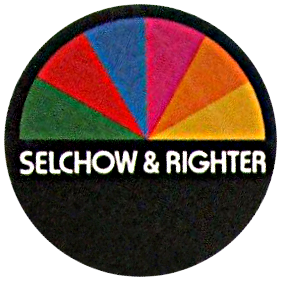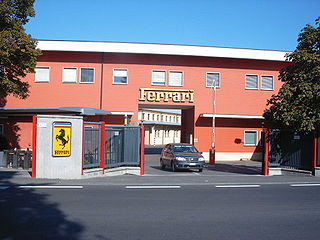The Volvo Group is a Swedish multinational manufacturing company headquartered in Gothenburg. While its core activity is the production, distribution and sale of trucks, buses and construction equipment, Volvo also supplies marine and industrial drive systems and financial services. In 2016, it was the world's second largest manufacturer of heavy-duty trucks.
A record label, or record company, is a brand or trademark associated with the marketing of music recordings and music videos. Sometimes, a record label is also a publishing company that manages such brands and trademarks, coordinates the production, manufacture, distribution, marketing, promotion, and enforcement of copyright for sound recordings and music videos; also conducting talent scouting and development of new artists ; and maintains contracts with recording artists and their managers. The term "record label" derives from the circular label in the center of a vinyl record which prominently displays the manufacturer's name, along with other information. Within the mainstream music industry, recording artists have traditionally been reliant upon record labels to broaden their consumer base, market their albums, and be both promoted and heard on music streaming services, radio, and television. Record labels also provide publicists, who assist performers in gaining positive media coverage, and arrange for their merchandise to be available via stores and other media outlets.
Market segmentation is the activity of dividing a broad consumer or business market, normally consisting of existing and potential customers, into sub-groups of consumers based on some type of shared characteristics. In dividing or segmenting markets, researchers typically look for common characteristics such as shared needs, common interests, similar lifestyles or even similar demographic profiles. The overall aim of segmentation is to identify high yield segments – that is, those segments that are likely to be the most profitable or that have growth potential – so that these can be selected for special attention.
Marketing management is the process of developing strategies and planning for product or services, advertising, promotions, sales to reach desired customer segment.
Eaton Corporation plc is a multinational power management company with 2018 sales of $21.6 Billion, founded in the United States with corporate headquarters in Dublin, Ireland. Eaton has approximately 99,000 employees and sells products to customers in more than 175 countries.
Porter's generic strategies describe how a company pursues competitive advantage across its chosen market scope. There are three/four generic strategies, either lower cost, differentiated, or focus. A company chooses to pursue one of two types of competitive advantage, either via lower costs than its competition or by differentiating itself along dimensions valued by customers to command a higher price. A company also chooses one of two types of scope, either focus or industry-wide, offering its product across many market segments. The generic strategy reflects the choices made regarding both the type of competitive advantage and the scope. The concept was described by Michael Porter in 1980.
Marketing strategy is a long-term, forward-looking approach to planning with the fundamental goal of achieving a sustainable competitive advantage. Strategic planning involves an analysis of the company's strategic initial situation prior to the formulation, evaluation and selection of market-oriented competitive position that contributes to the company's goals and marketing objectives.
An imprint of a publisher is a trade name under which it publishes a work. A single publishing company may have multiple imprints, often using the different names as brands to market works to various demographic consumer segments.

Beiersdorf AG is a German personal-care company based in Hamburg, manufacturing personal-care products and pressure-sensitive adhesives. Its brands include Elastoplast, Eucerin, Labello, La Prairie, Nivea and tesa.

The Tetris Company, LLC (TTC) is based in Hawaii and is owned by Henk Rogers and Alexey Pajitnov. The company is the exclusive licensee of Tetris Holding LLC, the company that owns Tetris rights worldwide and the Tetris Company licenses the Tetris brand to third parties.

Selchow and Righter was a 19th- and 20th-century game manufacturer best known for the games Parcheesi and Scrabble. It was based in Bay Shore, New York.
Licensing means renting or leasing of an intangible asset. It is a process of creating and managing contracts between the owner of a brand and a company or individual who wants to use the brand in association with a product, for an agreed period of time, within an agreed territory. Licensing is used by brand owners to extend a trademark or character onto products of a completely different nature.

Dover Corporation is an American conglomerate manufacturer of industrial products. Founded in 1955 in New York City, Dover is now based in Downers Grove, Illinois, and employs more than 26,000 people worldwide. Dover's business is divided into Three segments: Engineered Systems, Fluids, and Refrigeration & Food Equipment. Each segment holds operating companies that are run like independent companies. Dover is a constituent of the S&P 500 index and trades on the New York Stock Exchange under "DOV". Dover is ranked 360th on the Fortune 500.
A market analysis studies the attractiveness and the dynamics of a special market within a special industry. It is part of the industry analysis and thus in turn of the global environmental analysis. Through all of these analyses, the strengths, weaknesses, opportunities and threats (SWOT) of a company can be identified. Finally, with the help of a SWOT analysis, adequate business strategies of a company will be defined. The market analysis is also known as a documented investigation of a market that is used to inform a firm's planning activities, particularly around decisions of inventory, purchase, work force expansion/contraction, facility expansion, purchases of capital equipment, promotional activities, and many other aspects of a company.

Mega Brands Inc., formerly known as Mega Bloks Inc. and Ritvik Holdings, is a Canadian children's toy company currently owned by Mattel. Mega Bloks, a line of construction set toys, is its most popular product. Its other brands include Mega Construx, Mega Puzzles, Board Dudes and Rose Art. The company distributes a wide range of construction toys, puzzles, and craft-based products.
Russobit-M is one of the largest distributors of PC games in Russia and the CIS, and is a key player in the PC game industry. Since 2003, it has partnered with GFI to release game software and DVDs throughout Russia.

A brand is an overall experience of a customer that distinguishes an organization or product from its rivals in the eyes of the customer. Brands are used in business, marketing, and advertising. Name brands are sometimes distinguished from generic or store brands.
A fast casual restaurant, found primarily in the United States, does not offer full table service, but advertises higher quality food than fast food restaurants, with fewer frozen or processed ingredients. It is an intermediate concept between fast food and casual dining, and usually priced accordingly. The category is exemplified by chains such as Chipotle Mexican Grill, Shake Shack, Boston Market, Bruegger's, Captain D's, Culver's, Dig Inn, Freddy's Frozen Custard & Steakburgers, Newk's Eatery, Noodles & Co., Panera Bread, Pizza Ranch, Pollo Tropical, Portillo's, Smashburger, Vapiano and Zaxby's.

ERGO is a group of insurance companies owned by Munich Re. ERGO is one of the largest insurance groups in Europe. It operates in over 30 countries, especially in Europe and Asia. In Europe, ERGO claims to be number 1 in the health and legal expenses insurance segments, and in its home market of Germany it is among the market leaders. It has over 40,000 full-time employees.
Markstrat is a simulation game, created by Jean-Claude Larréché, that lets the players take control of a virtual corporation; making decisions on its behalf. Jean-Claude Larréché and Professor Hubert Gatignon developed the simulation from 1974 to 1977. After the game was developed it was distributed on an ad-hoc basis by INSEAD. The game is widely known, and played in over 500 academic institutions, including 8 of the top 10 international business schools and 25 of the top 30 in the US. The players of the simulation have to make number of decisions, in marketing, finance, research and development areas, in order to achieve a better performance than the competing players who also take control of a company.








